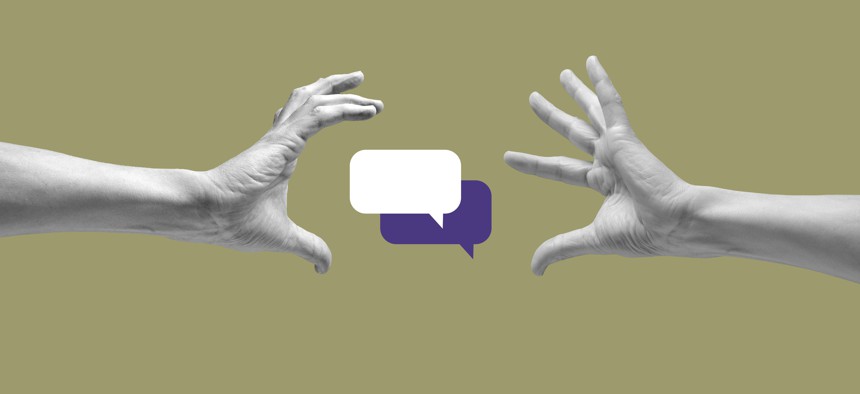Twitter Turbulence Under Elon Musk Poses Headache For Governments

Boris Zhitkov via Getty Images
States and localities have come to depend on the social media platform to get information out in emergencies and other situations. But a surge in imposter accounts has some worried.
From celebrities to sitting senators, it’s seemed in recent days that no one was safe from parody or imposter Twitter accounts.
Government agencies are no exception. And with Twitter’s flip-flopping verification processes under new owner Elon Musk, public-sector social media managers are anxiously waiting to see what will happen next with a platform they’ve come to rely on.
“I can tell you that the government agencies that we hear from are very concerned about imposter accounts, with these parody accounts, and there's a whole lot of confusion,” said Kristy Dalton, CEO and founder of Government Social Media, a network of public sector social media specialists.
In many cases, the rogue accounts that have cropped up poke fun at government entities.
“You can use the Peach Pass to access the toll lane on Rainbow Road to avoid all blue shells,” reads one tweet from a Georgia Department of Transportation parody account, referencing the popular video game “Mario Kart.”
A Colorado Department of Transportation parody account employs dark humor to highlight controversial policies or projects.
“We are proud that the majority of the most dangerous roads in the [Denver] metro area are CDOT state highways. Our job is to design roads to get people where they are going quickly regardless of the consequences. Safety third!” reads one of the imposter tweets.
Meanwhile, two accounts impersonated Chicago Transportation Authority President Dorval Carter, prompting the agency to flag the fakes.
But it’s not the jokes or critiques that are unnerving government officials, Dalton said. It’s the potential to spread misinformation, and if those accounts can pay for a blue checkmark–which has long indicated an account’s authenticity–that threat grows more worrisome.
Earlier this month, shortly after Musk took over at the company, Twitter launched its Twitter Blue “premium subscription service,” offering checks and other “premium features” to users willing to pay a $7.99 monthly fee. But within days the company halted the program as fake accounts surged. Musk has since indicated that Twitter has plans to relaunch the initiative at the end of November.
Previously, a blue checkmark next to a Twitter user’s name meant that an account had gone through a vetting process to determine its authenticity.
“There has been a lot of chatter in our communities about concern over the checkmark and the fact that parody accounts can be dangerous for government agencies, especially during critical times,” Dalton said.
Government agencies and officials have long-had a complicated relationship with social media. In some instances, especially during the Covid-era, it has served as a conduit for harassment toward public officials. In other cases, agencies have made ill-advised posts that led to intense blowback from other users. There are examples of more light-hearted flubs. As well as agency straight-talk about problems.
But many government organizations have learned to embrace platforms like Twitter and Facebook over the years as a critical outlet to get information to the public quickly, about topics ranging from natural disasters to road closures. Twitter can be especially helpful during emergencies, Dalton explained.
Unfortunately, though, critical situations are also ripe grounds for spreading misinformation, and Twitter’s chaotic verification changes stand to make things worse.
Believable impersonations are easily within the realm of possibility. Last week, a Washington Post reporter successfully created an account posing as Massachusetts Sen. Ed Markey, complete with a blue check. That prompted Markey to call on Musk to share more details about Twitter’s new verification process.
To combat impersonations, Twitter created “official” labels last week, which added a smaller gray check to verified accounts and cannot be purchased. But just hours after rolling it out, the company repealed that feature.
The official label was a step in the right direction, Dalton said, and many social media managers are watching to see if it’ll return. But even if it does, it likely won’t be the end of the verification and impersonation saga.
“What [the official label] still doesn't get to is the fact that when people see that blue checkmark on any platform, they assume that that means officially verified, and you can trust the source of information,” Dalton said. “And I think we learned over the past week with parody accounts all across the board, even parody accounts of Elon Musk, that that's not the case.”
While it's not clear if government agencies are choosing to abandon Twitter, some are choosing to invest less time and fewer resources into the platform, Dalton said. But many agencies have large followings–in some cases, hundreds of thousands of followers–and the decision to give up that reach is a difficult one.
Molly Bolan is the assistant editor for Route Fifty.
NEXT STORY: E-bike Battery Fire Spike Spurs NYC Council to Rethink Regulation






